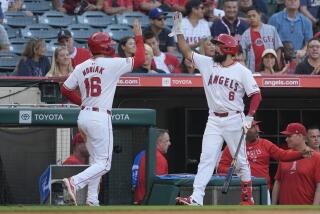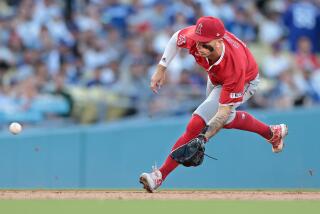How About Howell? : He Is the Angels’ Third Baseman for as Long as He Can Hold the Position
- Share via
The trouble with being called the Angel third baseman of the future is that it means someone else is already the Angel third baseman of the present.
Which is where Jack Howell found himself last season: Right between a 12-year veteran, Doug DeCinces, and a hard place, the bench.
The Angels loved Howell. Couldn’t say enough nice things about him. He played great defense. He hit for power, for average. His favorite collar color was blue.
Problem was, the Angels didn’t have much infield employment available in Anaheim. Third base belonged to DeCinces and rightfully so, what with a 1986 season that included 26 home runs and 96 runs batted in. Shortstop was out of the question--Dick Schofield was there. Second base was property of Mark McLemore and, later, Johnny Ray. Wally Joyner owns the rights to first base for the next decade or so.
So Howell improvised. He occasionally platooned at third, much to the dismay of DeCinces. He learned to play left field. He even filled in at second base and right field during late-inning emergencies. Anything, he figured, but another visit to Edmonton and the Angels’ triple-A team.
“I think we all knew Jack was going to be the third baseman of the future,” said Rick Down, an Angel special assignments coach who helped tutor Howell in the minor leagues. “It was just a matter of when. But you wanted his bat in the lineup.”
It was there, all right. Though Howell could probably do without the .245 batting average, he still hit 23 homers and added 64 RBIs. Better yet, the Angels more than doubled his number of game appearances from a season earlier and increased his at-bats threefold.
As for lasting moments, how about Howell’s home run against Tim Stoddard on national television against the New York Yankees at fabled Yankee Stadium last September? Stoddard throws, Howell swings and his bat shatters in his hands. Meanwhile, the ball sails inexplicably toward and then over the right field wall. You figure it out; Howell isn’t about to try.
But that was only a swing to cherish. The news to really remember was the Angels’ surprise decision to jettison DeCinces and his .234 average, 16 homers and 63 RBIs shortly before season’s end. The four-year wait was over; third base was Howell’s for the taking.
Howell grabbed hold and he’s not in any hurry to give it back. That much is evident as you watch Howell go through his daily training ritual: One of the first to arrive on the practice field. Intense in the batting cage. Intense fielding ground balls. Intense at exhibition games.
It’s not just a job; it’s his job.
“His work ethic . . . it’s unparalleled,” said Joe Maddon, who scouted Howell in college and now is a roving Angel minor league instructor. “He possibly works too hard at times. Jackie has a tendency to put pressure on himself at times.”
Said Bill Bavasi, Angel director of minor league operations: “(Howell) has a big desire to do well. He lives to learn. He likes to pay attention. He likes to talk to players about hitting. Hell, he might listen too much; not too much, maybe, but to too many people. Maybe the best advice he could get is from Jack Howell.”
But that’s the Howell way. And since when is occupational singlemindedness a crime? It got Howell to triple-A (bypassing double-A entirely) in just two seasons. It got him an audition in the big leagues after just three seasons in the minors. And it got him a full-time third base job in four years. So what’s the beef?
“I’ve worked a little bit too hard, but hard work is what got me here,” Howell said. “A lot of times I think guys work hard to get here and then they get here and they kind of quit. You’ve heard stories of it: A guy works his butt off to get here and then kicks back and puts it in cruise. I would never want that to happen and probably until the day I die or my last ballgame, I will be a guy who works hard. That’s just my nature.”
Another popular theory about Howell is that he didn’t know when to relax, that his emotions were stretched tautly and that it affected his play. In 1985 he hit .373 with Edmonton. The Angels called him up and he hit .197 after 43 games. The next year he left Edmonton with a .359 average, only to hit .272 with the Angels--acceptable, but not entirely what Howell was hoping for.
Last season was better. He stayed the full year and, at times, enjoyed himself. There was the month of April, when he hit .303. In four of six months of play, Howell had 10 or more RBIs. He committed just seven errors in 243 chances at third, second, left field and right field.
But he also had a month of August that included just one home run and three RBIs. His average away from Anaheim Stadium last year wasn’t anything to show on a scoreboard, either--just .219. And his average against left-handed pitching was an unimpressive .123.
Possible explanations are available. This one from Angel coach Down:
“Young players try to come out and prove themselves,” he said. “They prove themselves to the organization and then they have to prove to themselves that they belong in the big leagues. Once they realize that, it’s, ‘Hey, I’m a big league player. I deserve to be here.’ But you don’t have to consistently go out there and prove to everybody and every other idiot around here that you’re a player. That’s a lot of pressure and I think young ballplayers do that. It’s almost like a social problem.
“I think Jack’s come out and had more than just enough success: 20-plus home runs . . . 60-something RBIs . . . anything you want defensively. He belongs in the big leagues and I think he knows that, he believes in his heart. And that’s why you’re going to see a more relaxed Jack Howell and see him reach his potential. Jack Howell knows he belongs here now.”
All this strikes a bit of nerve with Howell. It’s not like he wanted to play four positions last year, he said. But it was the best the Angels could offer and he was happy to accept the opportunity. But relax? When you’re trying to remember what throw goes where, to what cutoff man, to what base? And hit, too? Hard to loosen up under those circumstances.
“I’ve never been in a position where I can sit back,” Howell said. “I mean, last year I was playing left field. So how can I necessarily say I’m going to be the left fielder for the next 10 years? So sitting back and relaxing and knowing I belong here. . . . I was learning different positions and doing all kinds of different things. There was a fair amount of insecurity, or whatever the word is you want to use. This year that’s a little bit different. I feel a little more secure here. I know, looking around me, I don’t see too many other third basemen and I got to believe that as long as I show up and give 110% every day and do whatever I can to help the team win, I’m going to be here awhile.”
Not that the Angels are complaining about Howell; they aren’t. Gene Mauch wanted Howell in the lineup enough to create, in essence, a temporary opening in left field last year. Then he helped approve DeCinces’ departure. The message is clear enough: The Angels don’t want the position returned. They want Howell to hold on tightly for years.
Need proof? Glance at the spring training roster and you find the number of legitimate third base challengers at zero. Gus Polidor could play there in a pinch, but that is just if Howell suddenly were not available.
Howell wasn’t always such a wanted commodity. He was a first baseman-shortstop when Maddon first saw him at Pima Junior College in Tucson. He remembered thinking that Howell had a good throwing arm, adequate defensive skills and a nice swing. That was it.
“He wasn’t the type of guy that when you went and saw him he stood out,” Maddon said. “He was the kind of kind you had to see on a daily basis to really appreciate.”
Maddon followed Howell’s career to the University of Arizona and at one point, recommended that the Angels use a draft choice on the infielder. The Angels were curious, so they told Maddon to find out Howell’s asking price.
It was high, at least too high for the Angels, who decided against wasting a draft pick on someone they considered unsignable. Maddon couldn’t argue the point. He had been in the organization for only two years and his clout was minimal. It also didn’t help Maddon’s case when another Angel scout, sent to evaluate Howell in a follow-up report, graded him lower.
“There was no way we could have gotten (Howell) the money he wanted,” Maddon said. “But what he failed to mention to me was that it was negotiable.”
Howell ended up in Alaska playing in a summer league. On Maddon’s recommendation, the Angels sent another representative, this time scouting supervisor Rick Ingalls, to try signing Howell as a free agent. Howell couldn’t grab the pen fast enough.
There was a season in Salem. Then a year in Redwood. Then straight to triple-A and Edmonton. And then to the big leagues. Now he finds himself in even more familiar surroundings, mainly that busy corner known as third base.
“It’s kind of like your home,” Howell said. “When I’m at home I kind of run things a little bit. I kind of take charge and some things revolve around what I say and what I do. And I think that when you play a bunch of different positions you kind of come in and try to do the best you can.
“With third, I kind of feel like it’s home, like it’s mine a little bit. I can do kind of the things I want to do.”
Make yourself comfortable, the Angels have said. Stay awhile. A long, long while.
More to Read
Go beyond the scoreboard
Get the latest on L.A.'s teams in the daily Sports Report newsletter.
You may occasionally receive promotional content from the Los Angeles Times.






